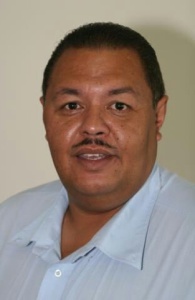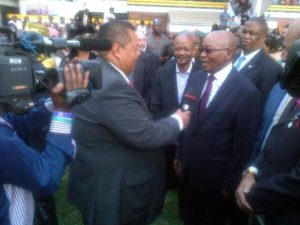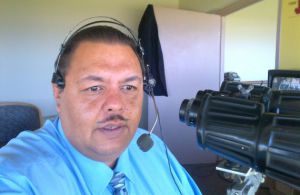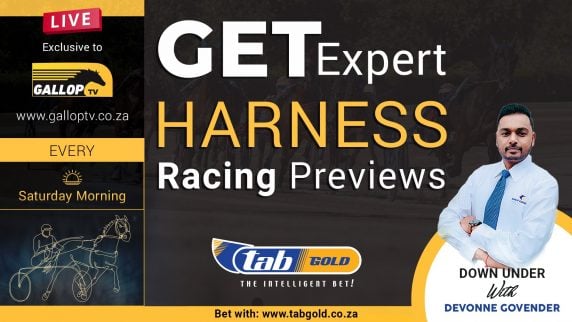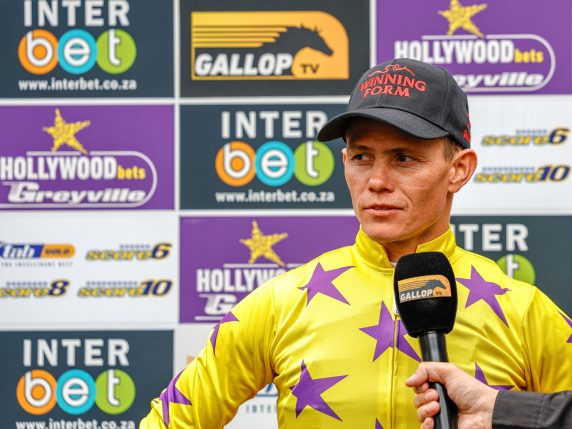“Aaaandaaaaa-waytheygo!” comes the familiar cry as the horses jump from the starting pens. The velvety voice that has called our horses home on our tv screens and racecourse loudspeakers for so long belongs to RouvaunSmit. He celebrates his 20th year of commentating this year, which is a good excuse to head up to the eagle’s nest and find out more about the man behind the mic.
Where did you grow up?
“I was born in Athlone and the family moved to Mitchells Plain in 1976. Westridge was one of the first suburbs of Mitchell’s Plain and we were one of the first families to move when it was starting out. Back in those days, you could open the door and it was just white sand wherever you looked, today it’s home to over a million people. My grandfather loved the horses. He listened to it on the radio mid-week and watched it on TV on weekends, so I grew up with it. The late John Claassen opened the first tote agency in Mitchells Plain in about 1985. I got a job as a teller and that was my first job in racing.
How did you get into commentating?
I was in my senior years of high school when I first said I wanted to be a DJ. I was always called on to be the MC for school sports and shows and so on and I thought ‘you know what, maybe this is something I should pursue’. We were at the movies at the Golden Acre and sitting behind us was Olaf Brinkman (he was doing the Good Hope breakfast show at the time). We chatted and he told me to ring Nico de Kock and arrange an audition. So I did. I joined their training and development programme and Duncan Maverick and I joined the new line-up when Good Hope went stereo on 1 April 1989. Dimitri Jagels and the late Jasper Gouws took me under their wing and taught me the ropes.
I joined the dissemination department at Kenilworth in about 1989 working with the likes of Mark Gray, Neil Andrews, Shaheen Shaw, David Carswell and the late Terrance Kirchner. We were based in the old North Stand, where the Pick & Pay offices are now. Mark left to start up IGN and he eventually poached Neil and Shaheen–Jehan Malherbe’e assistant callers at the time. For about a year Jehan called all on his own, then one day Mike Wanklin walked past my office and said we’re looking for a commentator, don’t you want to try out?
My first call was in a Cape Hunt race in the winter of 1994. It was the last race of the day andone of the Snaith boys was riding a horse called High Profile. Jehan said ‘High Profile will win. Start shouting him home from the 400m’. High Profile came from off the pace to win going away – I followed Jehan’s instructions to the letter and sounded like a genius!
How do you prepare?
You familiarise yourself with the card the day before, but take it race by race on the day. You analyse the form and follow the betting so you ‘ve got an idea who people fancy in the race – that helps in building character to a race when you call it. Your busy time is from the parade ring to the start. You’ve got to commit the fields and colours to memory. By the time they’re loading, you need to know them all, regardless of their odds. You try and give them all a shot and only focus on what’s happening at the front in the last 400m. And then as fast as you’ve memorised them, you need to forget them again and focus on the next race.
Career Highlights
I’ve worked on the national July broadcast since 2001, but this year was a highlight. I was standing in the parade ring with Brian Finch and said ‘what do you think are the chances that I can interview the president?’ We got Neil Butcher to go and ask. Two minutes later he came back and said ‘You owe me.’ I asked the President how he was enjoying his day and asked him whether any of the jockeys had given him any inside information. He replied jokingly “One of them did tell me, but wouldn’t give me his name!”
The Mauritius Turf Club invited me to commentate at their 2009 Jockey International. Ahmed Ajtebi was one of the riders. While training at our Jockey Academy he’d famously promised to buy his riding master a Ferrari the day he rode an international Gr1 winner. That Sunday evening he wound up at the same restaurant as TexLerena. Tex reminded him about the story and said “I think it’s time you made good on your promise.” NicoKritsiotis and I arrived at the tail end and Tex used the opportunity to say ‘You see, they’ve even sent in the heavies.’ I liftedAjtebi into the air and he went white. As I lowered him to the ground, I whispered“there’s a curio shop nearby with a matchbox Ferrari, go and get it.”He returned a few minutes later, presentedTexthe Matchbox car with a flourish and said “Tell Mr Moore I kept my promise!”A few months later I was at Meydan for their grand opening. Ajtebi recognised us in the queue and promptly arranged us all access badges.
At that Meydan meeting, Terry Spargo arranged for me to call a race. You are so high up in the grandstand that when you take your eyes off the binoculars, the horses are suddenly as tiny as ants – it’s quite a shock! Luckily you can call them home on the big screen. As I was heading back to my group, I bumped into Mike de Kock and John McVeigh and walked to the parade ring with them. En route we bumped into Sheikh Mohammed and his contingent, including Sting who was performing that night. The Sheikh stopped to talk to Mike who introduced me and the Sheikh said ‘very good voice’!
Hardest part of the job?
Maximum field sizes are daunting, but they’re actually easier as there’s more to say. Smaller fields are harder because there’s less to talk about. The worst is forgetting a horse’s name. It’s the most sinking feeling that any commentator can have. There will be one horse and it will be sitting in front and for the life of you, you cannot remember who it is and the more they go, the more you realise this horse isn’t going away. And it all happens so fast, there’s no time to grab a racecard and look down. It’s a feeling you cannot describe.
Secrets to your success?
Commentating is probably the most difficult job in racing. It’s a job I wouldn’t give my worst enemy. You need a skin thicker than a crocodile and you need to be able to take a lot of flack and criticism. You’ve got to realise that you will never please everyone and you’ll have supporters and detractors. 99.9 % of the time you can be absolutely flawless. The 0.1% you get wrong, you never hear the end of it. One lesson Jehan taught me that I live by is ‘stick to the basics, call it as you see it, don’t try and get clever and no-one can point a finger.’ I like to take the critics up there and show them what I do and when they see what you go through and how intense it is, suddenly your biggest detractors become your biggest marketers. There was a survey done a few years ago that found that race commentating was the 2nd most stressful job behind being a surgeon. It ranked joint 2nd with being an airline pilot.
You need confidence, because when you know you’ve got to do something, you always get butterflies. Even till today. I think the day the butterflies disappear is the day you should give up, because you’ve either become overconfident or you’ve lost your nerve. You’ve got to get butterflies.
Best / worst courses?
You get an entirely different view from the commentary box than you do on the grandstand or on TV and the higher up you are, the better you can read a race. Meydan is the best one I’ve called from. You’re sitting very high up and the commentary box is very sophisticated. Kenilworth is a favourite – you’re at the highest point of grandstand, slightly elevated out from the main building and looking down on the horses. The difficulty is having 3 different tracks and camera angles all finishing at the same pull up, but in a tight finish if you call them from the standside in, 9 times out of 10, you’ll get it right. I’d say Meydan, then Kenilworth and Clairwood.
The easiest is Durbanville. It’s very user friendly for a commentator as you can see everything apart from the 2000m mark, but you’re exposed to the mob and they can hurl abuse at you.
Greyville is tricky. Kimberley is an experience! You sit next to the camera person in the tower. The dust is something else.Your saving grace is the TV monitor – that does help – but both Jehan and I prefer to call from the binoculars – we trust our eyes far more than TV camerawork. For example, if you watch a race around the turn at Kenilworth, the camera angles change about 8 times– trying to call from that is very difficult.
Fairview has the worst angle to deal with. I feel Bumpy gets unnecessary flak – it’s a very tricky track to call from.
Do you still enjoy it?
After 20 years, I’m still enjoying it. Since Phumelela has come in, we now only have one commentator on duty on a race day and each of us has to do a whole meeting. We work 2 meetings on, 2 meetings off, which means that you can go 21 days without calling a race. That really gets the butterflies going again, let me tell you. One can do 8 races relatively easily, 9 races is a push. Any more than that is a nightmare. You can only concentrate and be at your best for so long. In broadcasting, they change people over every 3 to 4 hours, because after that, attention to detail becomes difficult. It’s physically exhausting to keep up the momentum and energy and stay on top of things. But there are 2 of us on Gr1 days which makes things easier and we try and help each other out when we can.
How do you keep it fresh?
Even though it’s the same thing and the same people, you need to find a fresh approach all the time. You know you’ve got 9 races you’ve got to call home and you’ve got to find 9 different ways to make it sound fresh. That’s the philosophy you’ve got to apply – you’ve got to keep changing and moving and that’s probably the trick to standing the test of time. Adapt or die.


